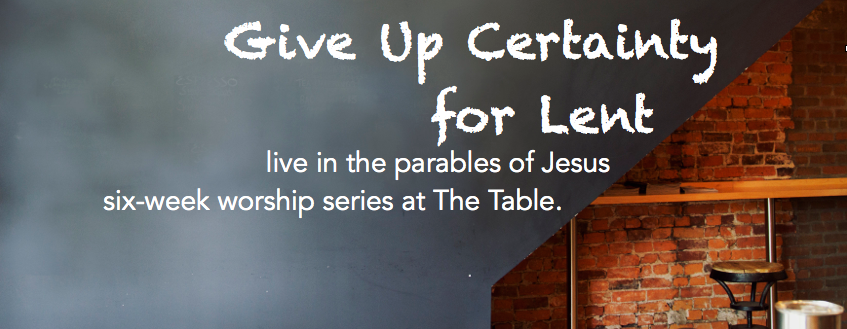We are inviting our community to Give Up Certainty for Lent as we root ourselves in the parables of Jesus. Today we move into our second week and the parable of The Weeds.
What is a parable? Exact definitions vary from “stories of life with religious or spiritual lessons” to “metaphors or similes that take narrative form.” We will be operating on an understanding of parables as “thin places” where the usual boundaries between heaven and earth, holy and ordinary, known and mysterious, come together. (From Kingdom, Grace, Judgment. Paradox, Outrage, and Vindication in the Parables of Jesus by Robert Farrar Capon, page 1).
The parables of Jesus take everyday experiences from the time of Jesus and turn them upside down. By showing us ordinary elements and experiences, parables provide a transparency to see the whole of our live and the holy in our lives in a new way (from John Indermark, Parables and Passion, Jesus’ stories for the days of Lent, page 11).
March 9 Matthew 13.33/Luke 13.20-21 Parable of The Leaven & The Mustard Seed
March 16 Matthew 13.24-30 Parable of The Weeds
March 23 Matthew 25.1-13 Parable of The Wise & Foolish Bridesmaids
March 30 Matthew 20.1-16 Parable of The Laborers in the Vineyard
April 6 Agape (David Scherer)
April 13 (Palm Sunday)Luke 15.11-32 Parable of The Prodigal Son
April 17 (Maundy Thursday Matthew 22.1-14 Parable of The Wedding Banquet
April 18 (Good Friday) Matthew 21.33-46 Parable of The Wicked Tenants
April 20 (Celebrate Easter) at 6:30 am Rose Garden McKinley Park & 10:30 am Sanctuary
Take time to read the Parable of The Weeds.
The weeds that are talked about in this parable are ones which are difficult to distinguish from wheat until they are both full grown. So if a field of wheat has these weeds one could not figure it out until the very end. Human tendency is often to “weed out” intruders, to “separate” those that belong from those that do not. At The Table we say “All Means All” and understand this to mean that God’s love is for all persons.
Consider this question: When in your life, have you experienced judgement about “belonging”. How was that judgement expressed? What, if anything, did you do about it?


0 Comments